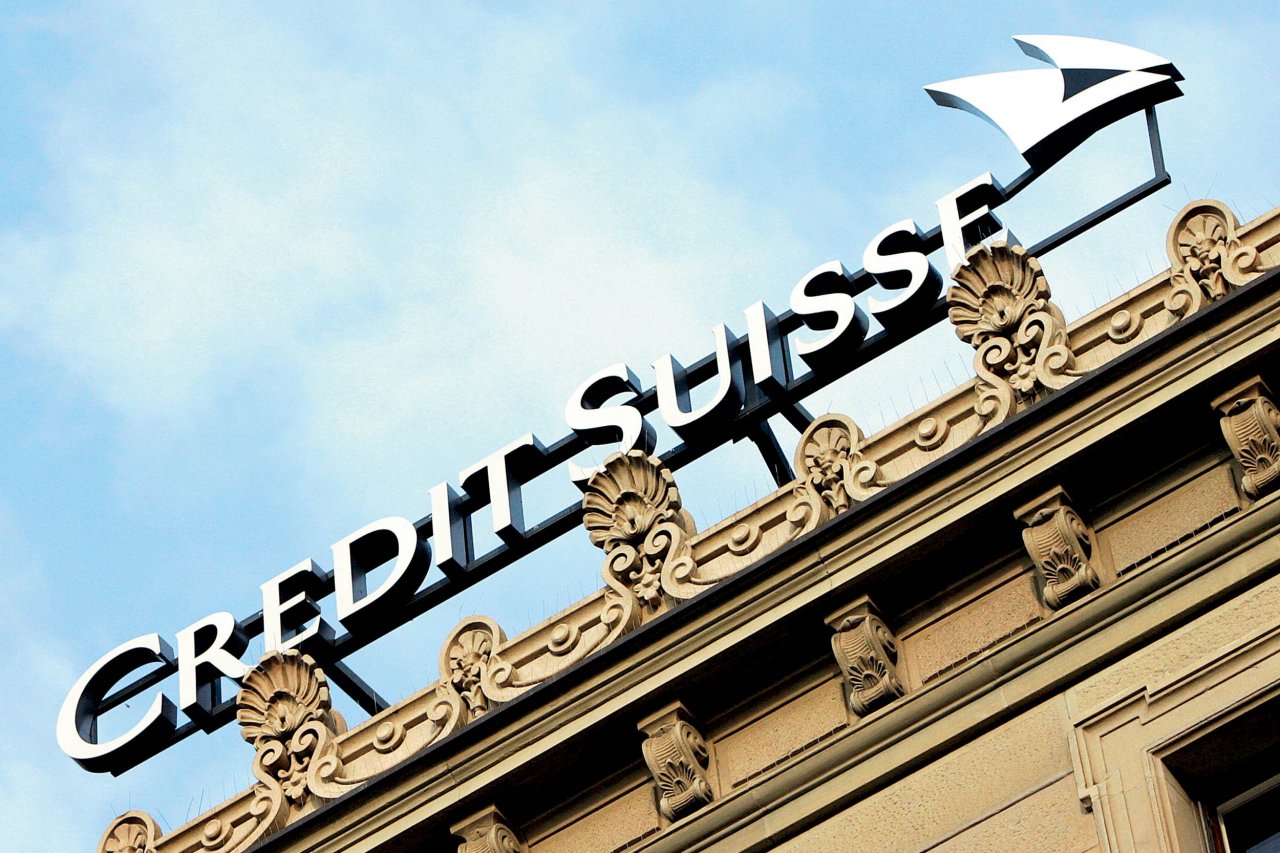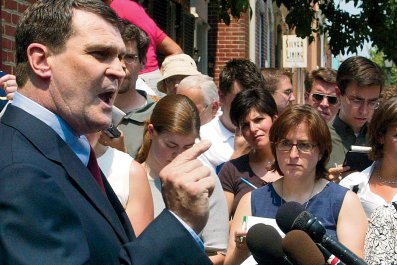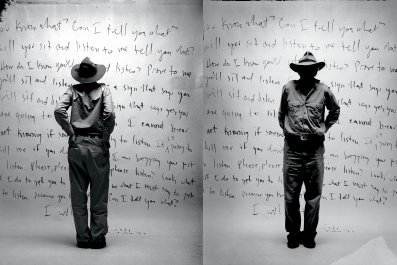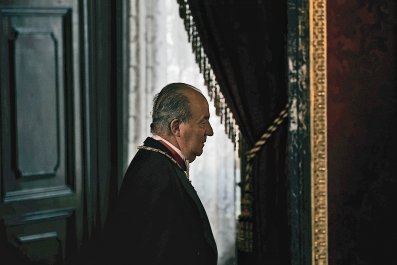Last fall, James Cole, the No. 2 man at the Justice Department, sent an intriguing email about the criminal investigation of Credit Suisse's offshore tax-evasion schemes for wealthy American clients. He asked Kathy Keneally, the agency's top official directing the protracted investigation of Switzerland's second biggest bank, "Can you give me an update on where we are with them?"
In that September 4 email, whose contents were obtained by Newsweek, Cole added this eyebrow-raising detail: "I got a call from Broderick Johnson who says the CEO wants to get this resolved."
Feature Stories is a part of a partnership between Newsweek and 92Y, New York's world-class cultural and community center dedicated to spreading new ideas and inspiring conversations about today's biggest issues. More 92Y American Conversation videos can be found here.
Broderick Johnson would be a lawyer and former lobbyist close to President Barack Obama. Last January, Obama named him assistant to the president and cabinet secretary—his job is to liaise with various government agencies, including the Justice Department. Cole's email was of interest in part because Johnson's former K Street lobbying firm, Collins Johnson Group, was representing Credit Suisse. But it was also notable because of the timing: The Justice Department had just finalized a deal for most of Switzerland's banking industry, more than 300 banks, to pay fines for enabling tax evasion for American clients. That agreement, the capstone of the Justice Department's seven-year crusade against offshore tax evasion through Swiss private banks, didn't include more than a dozen Swiss banks under criminal investigation, most notably, Credit Suisse.
Johnson's intervention appears to have worked: After some 18 months of stalemate, the bank started serious negotiations with the Justice Department. On May 19, Credit Suisse pleaded guilty to a single count of conspiring to aid tax evasion over decades, up to 2009, and agreed to pay the largest criminal tax fine in U.S. history—$2.6 billion—for having deceived the Justice Department, the Internal Revenue Service, the Federal Reserve and the Securities and Exchange Commission (SEC).
Big win for the Justice Department, right? Some say no. Despite that record-setting fine, many argue that Credit Suisse got off easy because it wasn't forced to reveal the names of what a Senate subcommittee said were 22,000 tax-dodging Americans hiding up to $12 billion offshore through the bank.
Critics, including current and former Justice officials, are also disturbed by that email. "These are not the normal channels," one senior person familiar with the issue tells Newsweek about the intervention of a man with the ear of both the president and the CEO of one of the world's most powerful banks. (A White House spokesman says, Johnson "reached out to DOJ in a limited capacity to facilitate conversations and was not involved in negotiating or lobbying" for a settlement. A Credit Suisse spokesman declined to comment.)
In 2009, UBS, Switzerland's largest bank, entered into a deferred-prosecution agreement—milder than Credit Suisse's guilty plea—paid a $780 million fine and was later forced to name the clients it had helped cheat on their taxes. That last bit was an astounding breach of Swiss bank secrecy laws, and it was only possible after the Swiss government enacted emergency powers allowing UBS to disclose the names of some 4,450 American clients to the IRS and Justice Department prosecutors. (Tax evasion isn't a crime in Switzerland.)
With that UBS disclosure, the naming and shaming of foreign private bankers and their American clients became the signature trophy for the Justice Department in its public war against offshore tax evasion. More than a dozen Swiss and foreign banks with major Swiss outposts, such as HSBC, were the subject of criminal investigations, with the Credit Suisse probe at the top of the list. Prosecutors indicted Wegelin, the oldest Swiss bank, in 2012—a move that led to the shuttering of the Swiss icon—and brought charges against some three dozen foreign private bankers, lawyers and advisers, as well as more than 70 wealthy American clients. More than 43,000 Americans with secret offshore accounts have come forward voluntarily to the IRS since 2009 to fess up.
The long-running Credit Suisse probe, which grew directly out of the UBS case and those 4,450 names, was supposed to be the next great public shaming by prosecutors, but that trophy went unclaimed. With UBS, "more than the fine, the names issue was critical and what [the Justice Department] negotiated for very, very hard," says a former Justice Department official. "It changed the course of banking. I don't see that here."
Credit Suisse gave the Justice Department only some 238 names, and even those weren't particularly valuable. "Honestly, I think most of the clients they outed are dead," one person familiar with the case tells Newsweek.
Edward Robbins, a tax lawyer in Beverly Hills, California, who spent 11 years, until 2004, as head of the tax unit at the Justice Department's prosecutorial office for central California, says Brady Dougan, Credit Suisse's American CEO, "will probably have an award ceremony in Zurich for protecting the names of clients."
"Caught in a Vise"
In an ironic twist, which Newsweek learned about through two sources briefed on the matter, Credit Suisse was prepared to turn over some 7,500 American client names more than a year ago. But then the Swiss government told the bank some of its senior people would be looking at time in a Swiss prison if those names were revealed. The reason: Swiss laws protecting the confidentiality of clients, which are the key to Switzerland's status as the world's leading offshore tax haven, with some $2.2 trillion in assets.
Credit Suisse, one source says, was "caught in a vise." That's partly what led to the standoff, and what makes the extraordinary deal it made with Justice all the more puzzling to critics. Not only did Credit Suisse avoid ratting out its clients, but none of its executives were charged, even though the bank admitted to cloak-and-dagger tactics to derail the investigation, ranging from destroying account records to giving its tax-evading clients offshore credit cards and smuggling cash into the United States for them. The bank also avoided having its U.S. licenses covering banking and investment-adviser work revoked—which could have killed it.
Instead, the world's 28th largest bank wrote a check and hardly missed a step. Dougan even told investors that the $2.6 billion fine would have no material impact on the bank. "It just seems like Credit Suisse bought their way out of a problem," one former senior Justice official tells Newsweek.
How did the bank avoid getting smashed? Justice had a mighty hammer: In 2011, prosecutors obtained subpoenas to force Credit Suisse to turn over records, the names of American clients and their account details. The New York branch of the Federal Reserve told Justice it had "a green light" to proceed, according to two persons briefed on the matter. (Andrea Priest, a New York Fed spokeswoman, declined to comment.) But the subpoenas were never enforced, in part because Bruce Swartz, head of Justice's unit that liaises with the State Department, argued that doing so would ignite a disastrous series of events: The Swiss government would issue a blocking order preventing Credit Suisse from complying with the subpoenas, and a U.S. court would then find the bank in contempt and levy hefty daily fines that could ultimately bankrupt the bank. If the bank refused to pay the fines, federal authorities would then be pushed to seize Credit Suisse's brick-and-mortar assets, like its corporate building on New York's Madison Avenue. Credit Suisse's stock price could plunge, sparking global financial jitters.
Keneally's reply to Cole's email of September 4 confirms that the pressure on Credit Suisse was building. "The prosecution team has also been continuing the investigation and has been presenting account holders to the grand jury and interviewing other cooperating witnesses," Keneally wrote in an email also obtained by Newsweek.
But the threat was a bluff, according to persons familiar with the issue. Late last fall, the Fed nixed an indictment, declaring that Credit Suisse was "systemically important" to the global economy; in other words, "too big to fail." The grand jury movement "was a facade," another person familiar with the matter says of those subpoenas. "No one actually believed that the Justice Department was ever going to indict the bank."
Still, in late October, Keneally told Credit Suisse's lawyers that the Justice Department was "prepared to indict," and Credit Suisse viewed the threat as "credible," says a Credit Suisse source.
In late February, when the Senate Permanent Subcommittee on Investigations, headed by Senator Carl Levin, D-Michigan, bashed Cole for the protracted investigation of Credit Suisse, he cited those unenforced subpoenas. "This is the heart of the matter—names, names, names," Levin said. "You've got to get names."
Complaining under oath that the veil of Swiss bank secrecy was "hard" and "frustrating," Cole stunned Levin—and many former Justice officials and senior tax lawyers—when he said that enforcement of subpoenas was not "an effective method to get the records," adding, "The Swiss block it."
All this was going on while the Justice Department was being pilloried over its reluctance to prosecute the large banks and lenders that caused the 2008 financial crisis; Justice Department insiders say the public bashing by Levin and the image of large banks as "too big to fail" rattled Cole.
Shortly after that Senate hearing, Cole had more conversations with the Fed's New York branch, which told him, again, that indictment would mean "instant death" for the bank, but that a $2.6 billion fine "would be a one-day story," i.e., not devastating, people familiar with the situation say. By mid-March, Cole and Keneally formally stopped demanding names as part of a deal, a Credit Suisse source says. "The landscape had changed" in the five years since the Swiss government enacted emergency powers allowing UBS to turn over names, a Justice source says. "The backlash in Switzerland" from Swiss voters, still upset that the Swiss government had used emergency powers to allow UBS to out clients, "was huge. We were realistic about what we could get."
In early March, Credit Suisse told agency officials it would cop a guilty plea, but it wanted a promise that U.S. regulators wouldn't yank its banking and investment-adviser licenses. Several conference calls later, the Justice Department, the New York branch of the Fed and the SEC all decided that the bank "didn't deserve" to lose its licenses, two government sources tell Newsweek.
Meanwhile, the Swiss government tried to broker an even better deal for Credit Suisse. In a last-ditch effort to try to save it from the black mark of a guilty plea, Swiss Finance Minister Eveline Widmer-Schlumpf walked into the Justice Department on May 2 for an unusual meeting with Attorney General Eric Holder. Senior foreign government officials almost never meet with America's top law enforcer, but she had an idea: have Credit Suisse out American client names through a 2009 protocol to a tax treaty with the United States that Zurich had blessed but was still on hold in the U.S. Senate. Get the protocol passed, she said, and the U.S. could apply for disclosure of some names.
Holder declined Widmer-Schlumpf's offer, according to persons briefed on the matter, who said the Justice Department "did not trust" the Swiss.
Still, Finma, Switzerland's banking regulator, seemed paranoid, and on May 16, three days before the settlement, it sent Credit Suisse a letter warning it not to break Swiss secrecy laws by outing clients on its own, rather than through tax treaties.
Justice officials insist they didn't go soft on Credit Suisse, but Levin tells Newsweek, "When the U.S. Department of Justice goes after a foreign bank that helped U.S. clients open secret offshore accounts, any settlement deal ought to require, at a minimum, the names of the U.S. account holders."
As serious on paper as a guilty plea is, says Jonathan Macey, a professor of corporate, finance and securities law at Yale University, "no one is taking these settlements seriously anymore."



























